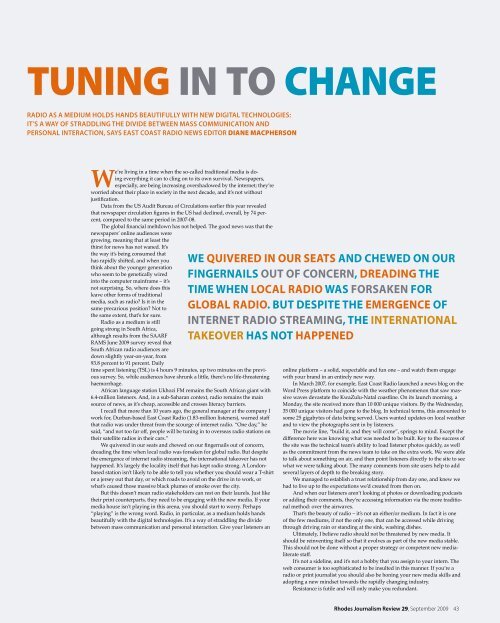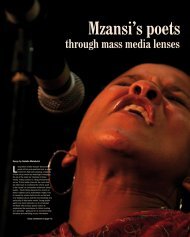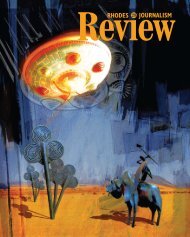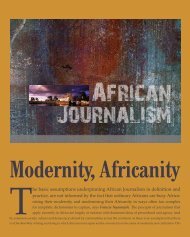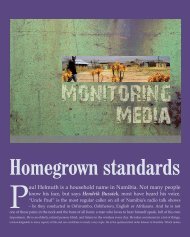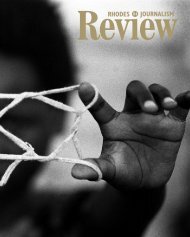Riding on the cup: - Rhodes Journalism Review - Rhodes University
Riding on the cup: - Rhodes Journalism Review - Rhodes University
Riding on the cup: - Rhodes Journalism Review - Rhodes University
You also want an ePaper? Increase the reach of your titles
YUMPU automatically turns print PDFs into web optimized ePapers that Google loves.
TUninG in To chanGe<br />
RADIO AS A mEDIUm HOlDS HANDS BEAUTIFUlly WITH NEW DIgITAl TECHNOlOgIES:<br />
IT’S A WAy OF STRADDlINg THE DIvIDE BETWEEN mASS COmmUNICATION AND<br />
PERSONAl INTERACTION, SAyS EAST COAST RADIO NEWS EDITOR diane macphers<strong>on</strong><br />
We’re living in a time when <strong>the</strong> so-called traditi<strong>on</strong>al media is doing<br />
everything it can to cling <strong>on</strong> to its own survival. Newspapers,<br />
especially, are being increasing overshadowed by <strong>the</strong> internet; <strong>the</strong>y’re<br />
worried about <strong>the</strong>ir place in society in <strong>the</strong> next decade, and it’s not without<br />
justificati<strong>on</strong>.<br />
Data from <strong>the</strong> US Audit Bureau of Circulati<strong>on</strong>s earlier this year revealed<br />
that newspaper circulati<strong>on</strong> figures in <strong>the</strong> US had declined, overall, by 74 percent,<br />
compared to <strong>the</strong> same period in 2007-08.<br />
The global financial meltdown has not helped. The good news was that <strong>the</strong><br />
newspapers’ <strong>on</strong>line audiences were<br />
growing, meaning that at least <strong>the</strong><br />
thirst for news has not waned. It’s<br />
<strong>the</strong> way it’s being c<strong>on</strong>sumed that<br />
has rapidly shifted, and when you<br />
think about <strong>the</strong> younger generati<strong>on</strong><br />
who seem to be genetically wired<br />
into <strong>the</strong> computer mainframe – it’s<br />
not surprising. So, where does this<br />
leave o<strong>the</strong>r forms of traditi<strong>on</strong>al<br />
media, such as radio? Is it in <strong>the</strong><br />
same precarious positi<strong>on</strong>? Not to<br />
<strong>the</strong> same extent, that’s for sure.<br />
Radio as a medium is still<br />
going str<strong>on</strong>g in South Africa,<br />
although results from <strong>the</strong> SAARF<br />
RAMS June 2009 survey reveal that<br />
South African radio audiences are<br />
down slightly year-<strong>on</strong>-year, from<br />
93.8 percent to 91 percent. Daily<br />
time spent listening (TSL) is 4 hours 9 minutes, up two minutes <strong>on</strong> <strong>the</strong> previous<br />
survey. So, while audiences have shrunk a little, <strong>the</strong>re’s no life-threatening<br />
haemorrhage.<br />
African language stati<strong>on</strong> Ukhozi FM remains <strong>the</strong> South African giant with<br />
6.4-milli<strong>on</strong> listeners. And, in a sub-Saharan c<strong>on</strong>text, radio remains <strong>the</strong> main<br />
source of news, as it’s cheap, accessible and crosses literacy barriers.<br />
I recall that more than 10 years ago, <strong>the</strong> general manager at <strong>the</strong> company I<br />
work for, Durban-based East Coast Radio (1.83-milli<strong>on</strong> listeners), warned staff<br />
that radio was under threat from <strong>the</strong> scourge of internet radio. “One day,” he<br />
said, “and not too far off, people will be tuning in to overseas radio stati<strong>on</strong>s <strong>on</strong><br />
<strong>the</strong>ir satellite radios in <strong>the</strong>ir cars.”<br />
We quivered in our seats and chewed <strong>on</strong> our fingernails out of c<strong>on</strong>cern,<br />
dreading <strong>the</strong> time when local radio was forsaken for global radio. But despite<br />
<strong>the</strong> emergence of internet radio streaming, <strong>the</strong> internati<strong>on</strong>al takeover has not<br />
happened. It’s largely <strong>the</strong> locality itself that has kept radio str<strong>on</strong>g. A L<strong>on</strong>d<strong>on</strong>based<br />
stati<strong>on</strong> isn’t likely to be able to tell you whe<strong>the</strong>r you should wear a T-shirt<br />
or a jersey out that day, or which roads to avoid <strong>on</strong> <strong>the</strong> drive in to work, or<br />
what’s caused those massive black plumes of smoke over <strong>the</strong> city.<br />
But this doesn’t mean radio stakeholders can rest <strong>on</strong> <strong>the</strong>ir laurels. Just like<br />
<strong>the</strong>ir print counterparts, <strong>the</strong>y need to be engaging with <strong>the</strong> new media. If your<br />
media house isn’t playing in this arena, you should start to worry. Perhaps<br />
“playing” is <strong>the</strong> wr<strong>on</strong>g word. Radio, in particular, as a medium holds hands<br />
beautifully with <strong>the</strong> digital technologies. It’s a way of straddling <strong>the</strong> divide<br />
between mass communicati<strong>on</strong> and pers<strong>on</strong>al interacti<strong>on</strong>. Give your listeners an<br />
We quivered in our seaTs and CheWed <strong>on</strong> our<br />
fingernails ouT of C<strong>on</strong>Cern, dreading The<br />
Time When loCal radio Was forsaken for<br />
gloBal radio. BuT desPiTe The emergenCe of<br />
inTerneT radio sTreaming, The inTernaTi<strong>on</strong>al<br />
Takeover has noT haPPened<br />
<strong>on</strong>line platform – a solid, respectable and fun <strong>on</strong>e – and watch <strong>the</strong>m engage<br />
with your brand in an entirely new way.<br />
In March 2007, for example, East Coast Radio launched a news blog <strong>on</strong> <strong>the</strong><br />
Word Press platform to coincide with <strong>the</strong> wea<strong>the</strong>r phenomen<strong>on</strong> that saw massive<br />
waves devastate <strong>the</strong> KwaZulu-Natal coastline. On its launch morning, a<br />
M<strong>on</strong>day, <strong>the</strong> site received more than 10 000 unique visitors. By <strong>the</strong> Wednesday,<br />
35 000 unique visitors had g<strong>on</strong>e to <strong>the</strong> blog. In technical terms, this amounted to<br />
some 25 gigabytes of data being served. Users wanted updates <strong>on</strong> local wea<strong>the</strong>r<br />
and to view <strong>the</strong> photographs sent in by listeners.<br />
The movie line, “build it, and <strong>the</strong>y will come”, springs to mind. Except <strong>the</strong><br />
difference here was knowing what was needed to be built. Key to <strong>the</strong> success of<br />
<strong>the</strong> site was <strong>the</strong> technical team’s ability to load listener photos quickly, as well<br />
as <strong>the</strong> commitment from <strong>the</strong> news team to take <strong>on</strong> <strong>the</strong> extra work. We were able<br />
to talk about something <strong>on</strong> air, and <strong>the</strong>n point listeners directly to <strong>the</strong> site to see<br />
what we were talking about. The many comments from site users help to add<br />
several layers of depth to <strong>the</strong> breaking story.<br />
We managed to establish a trust relati<strong>on</strong>ship from day <strong>on</strong>e, and knew we<br />
had to live up to <strong>the</strong> expectati<strong>on</strong>s we’d created from <strong>the</strong>n <strong>on</strong>.<br />
And when our listeners aren’t looking at photos or downloading podcasts<br />
or adding <strong>the</strong>ir comments, <strong>the</strong>y’re accessing informati<strong>on</strong> via <strong>the</strong> more traditi<strong>on</strong>al<br />
method: over <strong>the</strong> airwaves.<br />
That’s <strong>the</strong> beauty of radio – it’s not an ei<strong>the</strong>r/or medium. In fact it is <strong>on</strong>e<br />
of <strong>the</strong> few mediums, if not <strong>the</strong> <strong>on</strong>ly <strong>on</strong>e, that can be accessed while driving<br />
through driving rain or standing at <strong>the</strong> sink, washing dishes.<br />
Ultimately, I believe radio should not be threatened by new media. It<br />
should be reinventing itself so that it evolves as part of <strong>the</strong> new media stable.<br />
This should not be d<strong>on</strong>e without a proper strategy or competent new medialiterate<br />
staff.<br />
It’s not a sideline, and it’s not a hobby that you assign to your intern. The<br />
web c<strong>on</strong>sumer is too sophisticated to be insulted in this manner. If you’re a<br />
radio or print journalist you should also be h<strong>on</strong>ing your new media skills and<br />
adopting a new mindset towards <strong>the</strong> rapidly changing industry.<br />
Resistance is futile and will <strong>on</strong>ly make you redundant.<br />
<strong>Rhodes</strong> <strong>Journalism</strong> <strong>Review</strong> 29, september 2009 43


